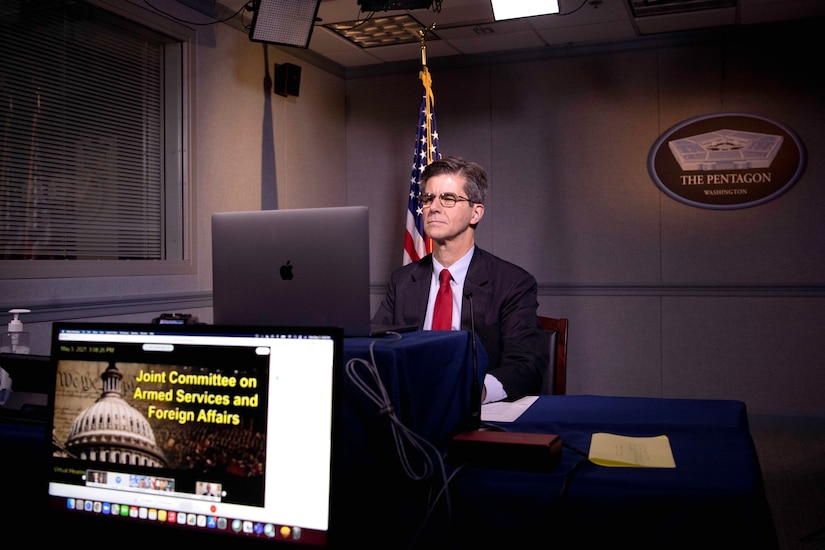May 6, 2021 | , DOD News
"There are many benefits to having common guidelines for space operations," John D. Hill, who is performing the duties of the assistant secretary of defense for space policy, said. He testified yesterday before the House Armed Services Committee.

"Among these are a safer, more sustainable, more stable and more predictable space operating environment for all space operators," he continued. "Importantly for [the] DOD, such an operating environment can also facilitate indications and warnings of hostile intentions and hostile acts."
Right now, Hill said, the DOD's policies and practices for its operations in space serve as a model for space behavior.
"[The] DOD models responsible behavior through our routine space operations, and [the] DOD works carefully to ensure that our space operations are consistent with international measures the United States supports, with relevant domestic and international law, including the law of armed conflict, and the inherent right of self-defense," he told lawmakers.
Further development of internationally agreed-upon rules for operations in space will benefit both the Defense Department and commercial space operations, Hill said.
"From the DOD perspective, United States leadership and the development of a rules-based order for space activities reap benefits for U.S. civil, commercial, scientific and national security space operators," he said. "As space activities worldwide become more prolific and more varied, voluntary non-binding international norms, standards and guidelines of responsible behavior can benefit U.S. national security and foster a conducive environment for growing global space activities."
Right now, said Space Force Lt. Gen. Stephen Whiting, the commander of Space Operations Command, the U.S. is already very transparent about its activities in space. One example of that is the U.S.-run website, space-track.org, which makes available space situational awareness services and information.
"Given our imperative to help keep the domain safe, our command ... has for many years, with the support of Congress, been providing orbital conjunction assessments to any space owner and operator around the globe, while also making available space-track.org to foster openness and transparency in the tracking of tens of thousands of objects on orbit," Whiting said.
Having agreed-upon internationally accepted rules for space operations is increasingly important now, Whiting said, given recent examples of the increased weaponization of space.
In 2007, he said, the Chinese conducted a test to demonstrate their ability to destroy an orbiting satellite with a kill vehicle launched from the ground. And the Chinese, he said, have continued to demonstrate a willingness to showcase capabilities to interfere with assets already in space.
"We continue to see the Chinese building satellites like the Shijian 17, which is a Chinese satellite with a robotic arm that could be used to grapple U.S. or allied satellites," he said. "We know they have multiple ground laser systems which could blind or damage our satellite systems."
The Russian can also interfere with space-based assets, he said.
"Russia has several ground-based lasers that can jam or blind our satellites and it's probable [that] they'll field more later this decade," he said.
The Russians have also launched satellites, such as Kosmos 2519 and Kosmos 2542, both of which demonstrated abilities to interfere with other assets in space. Kosmos 2542, launched in late 2019, Whiting said, was able to synchronize its orbit with a U.S. satellite. When the U.S. moved that satellite, the Russian satellite synchronized its own orbit a second time.
"Russia is a sophisticated space actor, so they must have known what they were doing, and obviously we do not support weapons tests near our satellites," Whiting said. "But let me be clear, even with this weaponization of space, we do not want a war to extend into space, and we want to do everything possible to deter that."






No comments:
Post a Comment